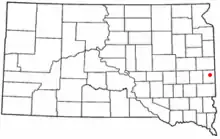Flandreau Indians
The Flandreau Indians were a minor league baseball team based in Flandreau, South Dakota. In 1902, Flandreau played as members of the Class D level Iowa-South Dakota League, winning a split–season title before disbanding. The Indians hosted minor league home games at Flandreau Park.
| Flandreau Indians | |
|---|---|
| Minor league affiliations | |
| Class | Class D (1902) |
| League | Iowa-South Dakota League (1902) |
| Major league affiliations | |
| Team | None |
| Minor league titles | |
| League titles (0) | None |
| Conference titles (1) | 1902 |
| Team data | |
| Name | Flandreau Indians (1902) |
| Ballpark | Flandreau Park (1902) |
History
The 1902 Flandreau Indians became charter members of the six–team Iowa-South Dakota League. The Iowa-South Dakota League was formed as a Class D level League and Flandreau joined the league on June 20, 1903, after the season had begun. The president of the Iowa–South Dakota League was J.U. Sammis, an attorney who practiced and resided in Le Mars, Iowa. Flandreau joined the Le Mars Blackbirds, Rock Rapids Browns, Sheldon, Sioux City Cornhuskers and Sioux Falls Canaries as charter Iowa-South Dakota League members.[1][2]
In their first season of play, the Flandreau Indians joined the league on June 20, 1902, playing under player/manager Arthur Hillebrand, who also served as a college football and baseball coach while managing Flandeau.[3] The Indians were given a record of 9–9 to begin the season, which made its overall first–half record 31–22 (22–13 in actual games played). Flandreau won the second–half title with a 29–6 record. Flandreau placed 2nd in the 1902 Iowa–South Dakota League overall standings, but won the second split–season title. The overall standings featured the 1st place Sioux Falls Canaries (65–24), followed by the Flandreau Indians (51–19), Sioux City Cornhuskers (56–40), Le Mars Blackbirds (43–48), Rock Rapids Browns 39–52 and Sheldon (14–71).[1][4][5]
The Sioux Falls Canaries won the first–half championship. After Flandreau won the second–half title, the Flandreau Indians were unable to continue the team for the playoff against Sioux Falls.[6][5][7]
Johnny Dorman of Flandreau won the 1902 Iowa-South Dakota League batting title with a batting average of .314, while Dan Stearns ended a lengthy playing career with the team at age 41. Manager Art Hillebrand and his brother Homer Hillebrand played together for the 1902 Indians. Art Hillebrand was a college football and baseball coach while serving as player/manager for the Flandreau Indinas. Art coached at Navy and Princeton, winning the 1903 Football National Championship at Princeton. Flandreau player Ralph Hutchinson played college football at Princeton with Hillebrand. Art Hillebrand was inducted into the College Football Hall of Fame in 1970.[8][9][10][1][4][5]
At the May, 1903 organizational meeting for the second season of the Class D level Iowa–South Dakota League, the Flandreau franchise did not send a representative and the franchise folded. At the meeting, the Sioux Falls franchise was represented by C.H. Craig, LeMars by Bobby Black, Sioux City by Dr. George B. Wood, Charles Hughson and Frank E. Lohr. Flandreau, Rock Rapids and Sheldon did not send a representative. The Council Bluffs Bluffers franchise was selected as a replacement city, represented at the meeting by Buck Keith and Frank Wilson.[11]
Flandreau, South Dakota has not hosted another minor league team.[12]
Today, the Flandreau Cardinals amateur team plays home games at Flandreau Park.[13][14]

The ballpark
The Flandreau Indians were noted to have played 1902 minor league home games at Flandreau Park. Originally called Riverside Park, Flandreau Park is still in use today as a public park with ballfields and amenities. Today, the ballpark plays host to the Flandreau Cardinals amateur baseball team. The location is 22974 Flandreau Park Road in Flandreau, South Dakota.[15][16][17][18]
Year–by–year record
| Year | Record | Finish | Manager | Playoffs/Notes |
|---|---|---|---|---|
| 1902 | 51–16 | 2nd | Art Hillebrand | Won 2nd half title Did not field a team for playoff |
Notable alumni
- Bill Carney (1902)
- Art Hillebrand (1902, MGR) College Football Hall of Fame
- Homer Hillebrand (1902)
- Ralph Hutchinson (1902)
- Rudy Kling (1902)
- Dan Stearns (1902)
See also
Flandreau Indians players
References
- "1902 Iowa-South Dakota League (ISDL) minor league baseball on StatsCrew.com". www.statscrew.com.
- "1902 Iowa-South Dakota League". Baseball-Reference.com.
- "Hillebrand Engaged as Princeton Coach" (PDF). New York Times. 11 December 1912.
- "1902 Flandreau Indians Statistics". Baseball-Reference.com.
- Johnson, Lloyd; Wolff, Miles, eds. (2007). The Encyclopedia of Minor League Baseball (Third ed.). Baseball America. ISBN 978-1932391176.
- "1902 Iowa-South Dakota League (ISDL) minor league baseball Standings on StatsCrew.com". www.statscrew.com.
- Lalire, Gregory (March 31, 2011). "Baseball in the West". HistoryNet.
- "Dan Stearns – Society for American Baseball Research".
- "Homer Hillebrand – Society for American Baseball Research".
- "Art "Doc" Hillebrand (1970) - Hall of Fame". National Football Foundation.
- https://usfamily.net/web/trombleyd/IASD.htm#1903 Season
- "Flandreau, South Dakota Encyclopedia". Baseball-Reference.com.
- "Argus Leader". www.argusleader.com.
- "Flandreau Cardinals deny Alexandria Angels' three-peat bid, advance to semifinals". The Mitchell Republic.
- "Flandreau Park in Flandreau, SD minor league baseball history and teams on StatsCrew.com". www.statscrew.com.
- "In the Park". www.cityofflandreau.com.
- "Tri-Valley Baseball Association > Home". www.trivalleybaseballassociation.com.
- "Ballpark Locations". www.minndak.org.